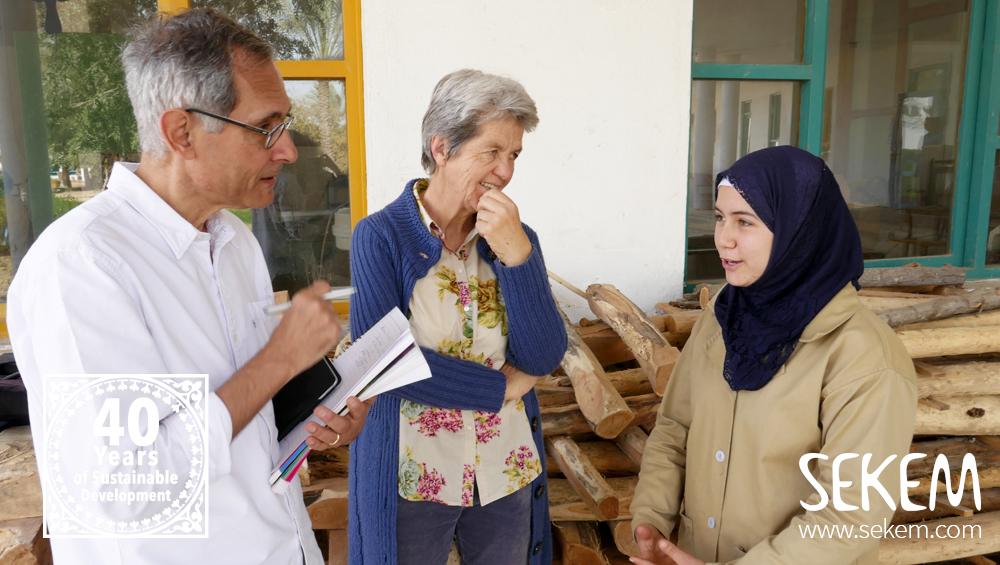Fausi Marti had been working as a lecturer at the University of Applied Sciences in Bern for 26 years. Meanwhile, the Swiss-Egyptian is retired and reports on his blog (www.fausi.net) on topics related to his Egyptian homeland. In 2012, he initiated the project for equipping the carpentry workshop at SEKEM. In this years’s March, Fausi Marti visited the SEKEM Farm and conducted several interviews with members of the SEKEM carpentry workshop. Parts of the interviews can be read here on SEKEM News.
Amani, one of the first young female carpenter students
Interview with Amani
Amani is 16 years old and comes from a small village near the SEKEM Farm. Twice a week she goes to the vocational school and four times to the carpentry workshop.
Fausi Marti: Amani, how did you get into the carpentry training?
Amani: They distributed information in my village. I already knew SEKEM because my sister goes to school here. There are almost no carpenters in my village, and certainly no females. In general, the training and employment opportunities are very limited. I wanted to do something unusual and chose to become a carpenter – I hope I will become even better than the boys!
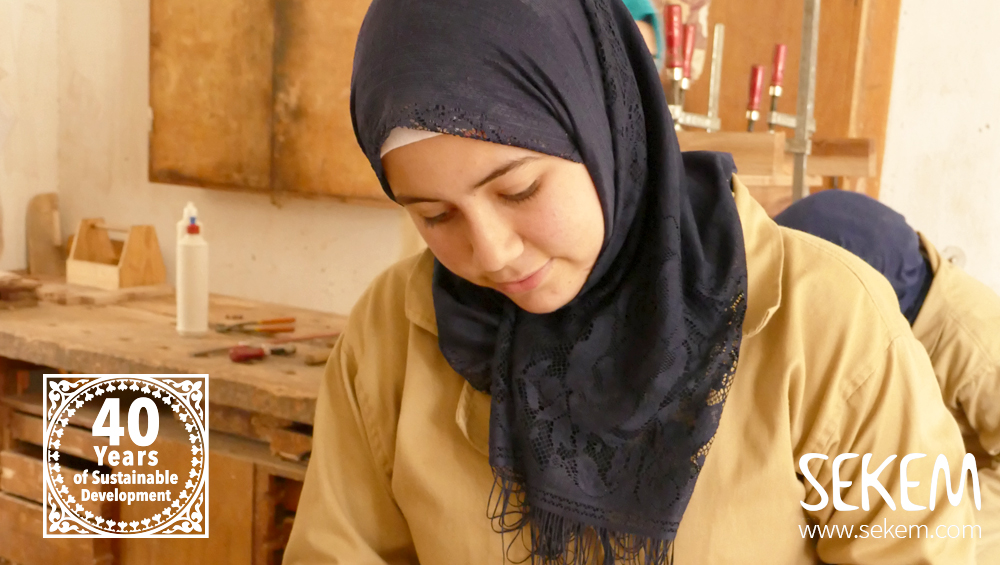
F.M.: How do you feel about the atmosphere together with the boys?
Amani: It’s fine, they are like brothers. The boys behave well – they just try to show what they can do, but we girls do the same.
F.M.: What did your parents say about your wish to become a carpenter?
Amani: Well, they definitely were not mad at me. They were quite happy that I found at least an apprenticeship and gave me a free hand.
F.M.: After half a year of training, do you have the feeling that you have already learned something?
Amani: Definitely! I’ve learned a lot, and I do apply what I’ve learned. At home there are sometimes repairs that I can take over.
F.M.: Where do you see yourself in ten years when you are 26?
Amani: In any case, I would like to continue learning after completing my apprenticeship, perhaps at a higher vocational school in the carpentry sector. When I have then finished higher education, I definitely want to come back to SEKEM. I could also imagine becoming a trainer.
Mohamed, training manager at SEKEM’s carpentry
Interview with Mohamed
Mohamed, in a way, grew up on the SEKEM Farm. In 1999 he started teaching carpentry and in 2010 he became the head of the carpentry workshop.
F.M.: Mohamed, how did you join SEKEM?
Mohamed: SEKEM did advertising in my village for the vocational training. I immediately applied for the vacancy and was invited for an interview. I think I did well as I had no troubles with reading the plans or drawing and they hired me.
F.M.: Now you are responsible for the education of the future carpenters. What do you think about the concept of dual education system?
Mohamed: It definitely makes sense to teach theory at two days a week – it’s even too less sometimes. Therefore, we use one of the four workshop days to specifically link the practical work with the theory.
F.M.: The carpentry is a training workshop, but increasingly taking over production orders. Is this not putting pressure to the training?
Mohamed: In fact, there are times when we are under production pressure when, for example, several doors, windows, desks or chairs are ordered for the SEKEM facilities. But so far, we have always been able to find a good balance. However, orders are also good for the awareness that we need to produce useful items and work economically.
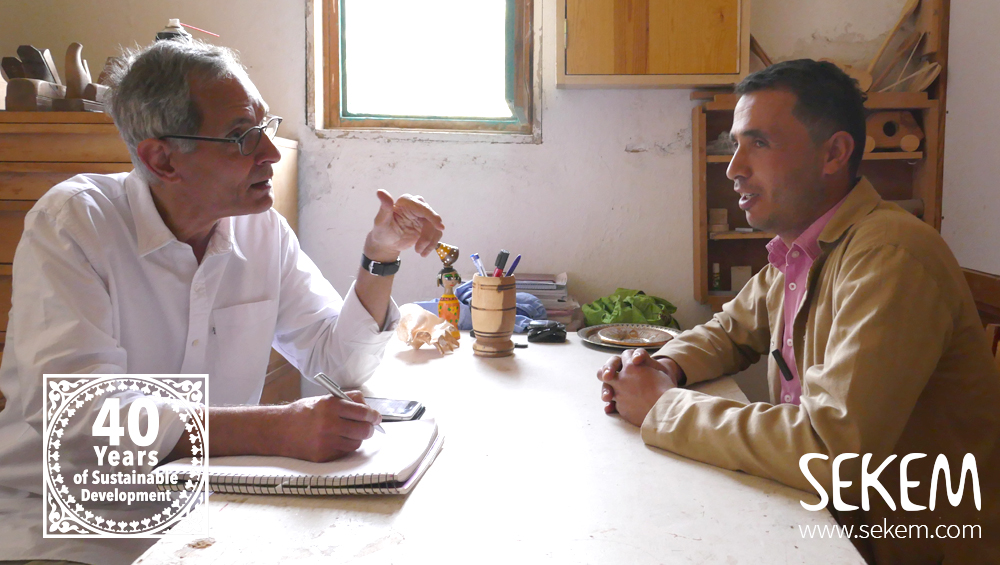
F.M.: For a year and a half, besides the boys, girls have also been learning in the carpentry workshop. How has this changed the atmosphere?
Mohamed: The atmosphere has improved a lot, it became much more pleasant. The boys try to impress the girls, and they are less rude than before. Likewise, the girls want to show what they can do.
F.M.: How do you deal with particularly talented students?
Mohamed: There are always students with special talents. There was one that immediately opened his own workshop after completing his apprenticeship and now wants to buy a machine from us. We give such trainees more advanced tasks, for example, by involving them in drawing new furniture models while the others only work from a ready drawing. Sometimes we also involve them when private costumers come in, which gives them a special incentive.
F.M.: Besides internal SEKEM orders, does the carpentry has also external orders
Mohamed: We have quite a few small orders from outside but via the SEKEM relationship network, not the market. We manufacture cabinets, tables, bespoke chairs, furnish entire children’s rooms or holiday homes, or undertake the maintenance of company furniture.
Francis, a dedicated carpenter from Switzerland, who supports SEKEM’s carpentry
Interview with Francis
In 2014, Francis came to the SEKEM for the first time as a consultant. The Swiss has run his own carpentry business for a long time, was a furniture designer and today works mainly as a trainer for young people with social problems or disabilities.
F.M.: Francis, how did you become an adviser to the SEKEM carpentry?
Francis: That was a happy coincidence. After years of responsibilities as an owner of a carpentry workshop, I wanted to reorient myself and was more concerned with the education and care of young people with problems. I’ve had a very good life so far and want to share some of my luck. At that moment, the offer from SEKEM came just right and today I like to return to Egypt from time to time in order to see developments.
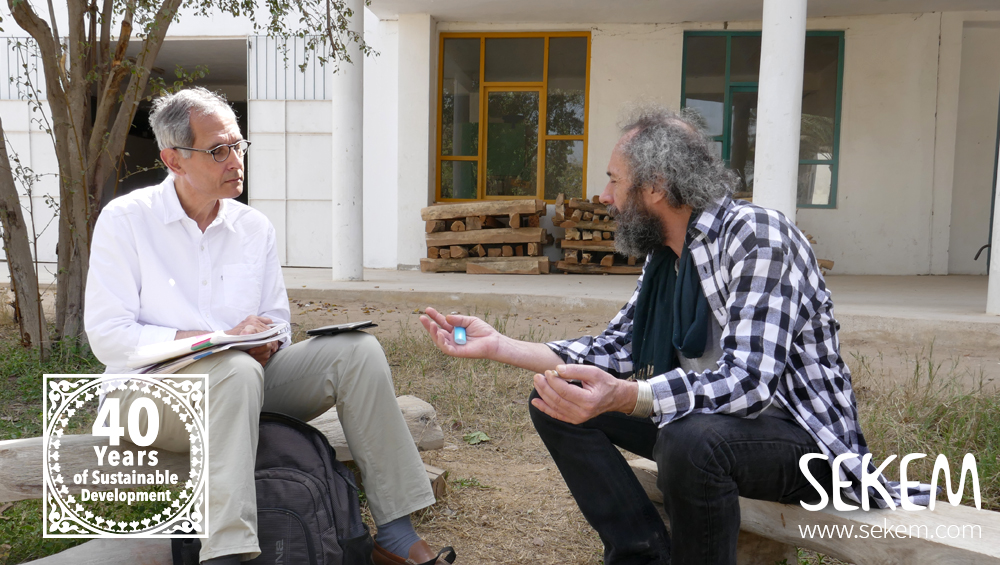
F.M.: Use your own resources instead of expensive imports, that is one of your contributions to the realignment of the carpentry.
Francis: That’s right. Egypt is not woodland, but there are certainly hardwoods such as the casuarina. There are hundreds of these trees on the SEKEM farm, which are also very common in the rest of Egypt. However, the tree has not been used for furniture production for a long time, because the wood is extremely hard and tears quickly. But that was mainly due to bad and wrong tools. We have changed that and today use the casuarina for the furniture industry.
New in SEKEM’s carpentry workshop: Egyptian casuarina wood
F.M.: What is important when using the Egyptian casuarina wood?
Francis: There is a lot. The first thing is to hit the trees in winter time, when they are not juicy. Then the trunks have to rest in the shade for one to two months and be sufficiently moistened. When cutting, it is important that the tool is perfectly maintained and sharpened. And then the woods have to dry for 10 to 12 months before they can be put together.
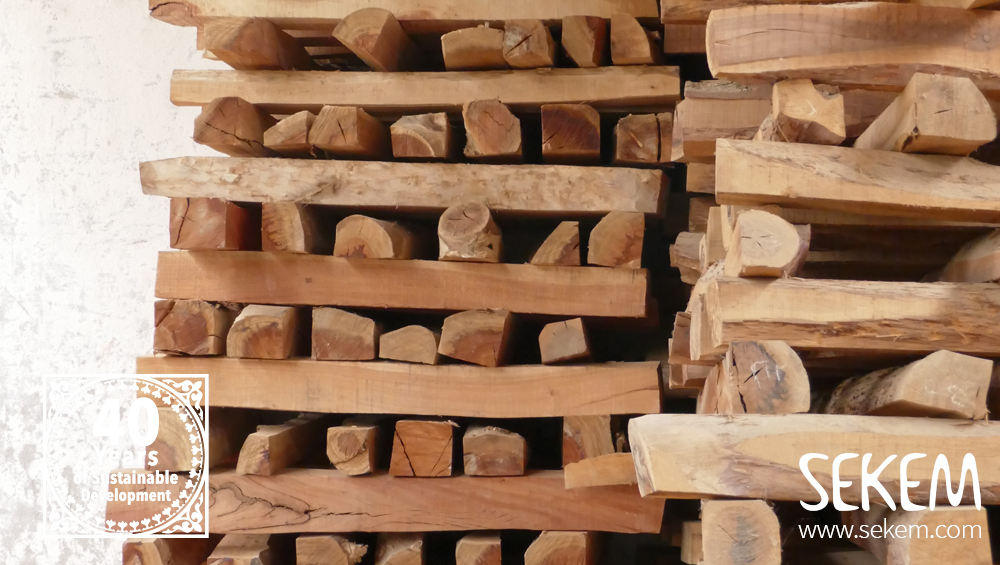
F.M.: The SEKEM carpentry is still in its early stages of marketing its products. What needs to be further done?
Francis: An important pillar is the systematic documentation of all products: photos, drawings, labels. This is the basis for advertising folders, in which we can emphasize the strength of our carpentry at the same time: We do custom-made wood works and meet the customer’s wishes! The carpentry services can also be communicated from mouth to mouth: trainers and students as advertising media for their own work. Also visiting days are possible. We need to think a lot about how the SEKEM carpentry can become more visible not only as a training workshop but also as a production company.
Promoting sensitivity to handling wood
F.M.: You trust in the capabilities of the carpentry a lot?
Francis: Of course, there is still a huge gap, for example, compared to teaching in Switzerland. But that’s not our focus. I see that the training team has grown together in the past years and they work in a friendly and trustful atmosphere. This is a great opportunity for the coming years. However, many students do not have a real sense for the carpentry work as they just want to learn something to have a degree. Beyond conveying technical skills, it is our task to promote the joy for the wood and the curiosity for the possibilities of this wonderful material.

F.M.: How can a deeper understanding of working with wood be supported?
Francis: We can, for instance, improve the third year of apprenticeship. Currently, there are two projects. The first one is an individual thesis about the production of a furniture according to a predetermined plan – students with special skills can do their own design. The second project is a two-week internship in a large Egyptian furniture factory. There, the trainees experience the daily work routine in a production plant that has to produce well, quickly and cost-effectively. Creativity and solid craft skills are the goals that we are approaching step by step.
The interviews were conducted by Fausi Marti
All photos: Copyright by Fausi Marti
Fausi Marti’s blog (German)
Girls' in SEKEM's Vocational Training Center
New machineries for SEKEMs mechanic workshop
Vocational Training for Biodynamic farmers

